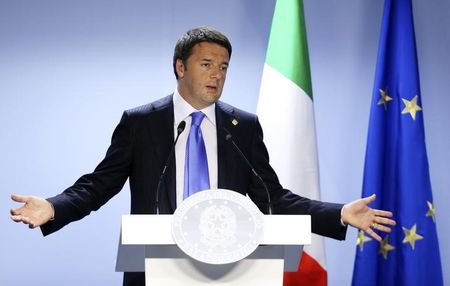Renzi’s reform bill clears parliamentary hurdle as Italy headwinds grow

By Gavin Jones and James Mackenzie
ROME (Reuters) – Italy’s Senate passed a first reading of a hotly contested constitutional reform bill on Friday, drawing a line under a parliamentary battle that has absorbed government attention as pressure grows for faster action on the economic crisis.
The bill, aimed at transforming the upper house into an unelected body and drastically reducing its legislative powers, requires many more months and perhaps a popular referendum in order to become law.
Prime Minister Matteo Renzi says the Senate overhaul – aimed at ending the kind of parliamentary stalemate left after a deadlocked election last year – is necessary to enable any government to push through effective reforms.
The fact the bill has cleared its first hurdle in parliament after weeks of bitter resistance from opposition parties will free him to respond to mounting calls for economic reform.
Data this week showed the euro zone’s No. 3 economy unexpectedly fell back into recession in the second quarter, contracting for the 11th time in the past 12 quarters and laying bare the scale of the challenge facing the government.
On Thursday, European Central Bank President Mario Draghi, in unusually direct comments, said Italy had not done enough to reform its labour market, bureaucracy or judicial system, resulting in an unfavourable climate for investment.
The economy is now expected to post little or no growth this year, compared with the government’s official forecast in April of a 0.8 percent expansion, offering no hope to the millions of unemployed Italians and creating negative repercussions for strained public finances.
Renzi came to office in February promising swift and comprehensive action to pull Italy out of a slump that has lasted more than a decade. However, progress has been slow and his signature achievement so far remains an 80 euro-($107)-a-month tax break for low earners. Plans for a broad reform of rigid labour market rules have been put back to 2015 at the earliest.
Renzi said he agreed with Draghi’s comments and they were not a criticism of his government. In a television interview on Thursday he insisted his economic strategy was sound and would eventually lift Italy out of crisis.
“Calmly, serenely, we are taking this country by the hand and pulling it out of the crisis,” said Renzi, who has promised to turn the economy around with a comprehensive strategy over the next 1,000 days.
LACK OF URGENCY
Analysts are increasingly questioning whether Italy can afford such a gradualist approach, echoing calls from opposition parties for a switch in focus from long-term constitutional reforms to the immediate problems of the economy.
Financial markets, calmed for months by Draghi’s pledge to protect the euro, have been increasingly twitchy, with the risk premium on Italy’s 10-year government bonds widening by more than 20 basis points over their safer German counterparts since the start of the week.
Riccardo Barbieri, chief European economist at Mizuho, said in a research note on Friday that Renzi’s honeymoon is over. He forecast the economy would shrink by 0.2 percent this year and urged a re-think of Renzi’s reform agenda in the report titled “Italy cannot wait 1,000 days.”
The long battle over the bill in parliament, which saw nearly 8,000 amendments tabled by opposition parties amid furious shouting matches, risked bogging down the government and holding up any drive on economic reform even longer.
On Thursday, parliament approved a package of incremental economic measures aimed at helping business, but none amounted to the kind of wide-ranging attack on structural obstacles likely to spark a turnaround.
They include a reduction in energy costs for small and medium-sized companies, a tax credit for firms that make new investments in machinery and new rules allowing insurers and credit funds to lend directly to business.
The plan, dubbed the “competitiveness decree” when it was presented by Renzi in June, has got a lukewarm reception from business leaders who said it lacked a clear strategy and failed to address the real needs of industry.
Prominent industrialist Alberto Bombassei, chairman of brake-maker Brembo, said the competitiveness decree had too many minor measures and was of no help to business which would benefit far more from a reduction in corporate tax rates.
“It seems a clear sign that the government has lost its direction at the moment,” he said in an interview in La Stampa newspaper on Friday.
(Editing by Louise Ireland)